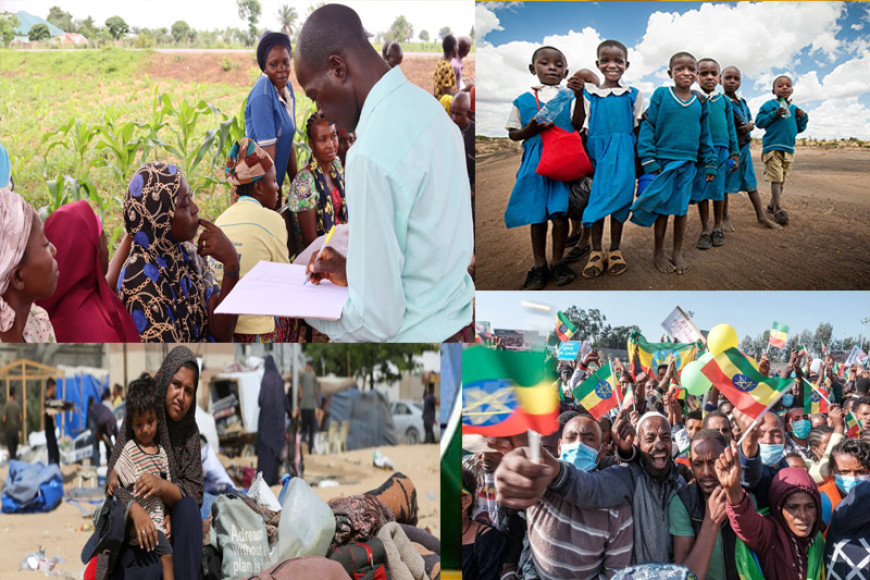"Global economic and political crises often intersect, leading to a cycle of instability that can disrupt entire regions and have far-reaching consequences for international security and economic systems. By. Samuel P. Huntington”
Nigeria: Economic Strain and Protests
Nigeria, Africa's most populous country and one of its largest economies, is facing severe economic challenges. Inflation in Nigeria has surged to 34.19% as of mid-2024, driven by a combination of currency devaluation, the removal of fuel subsidies, and persistent security issues. The naira has depreciated significantly against major currencies, making imports more expensive and exacerbating the cost of living crisis. This has led to widespread public dissatisfaction and protests.
The Take It Back Movement, led by activist Banwo Olagokun, has organized mass demonstrations in response to these economic difficulties. The movement argues that the government's measures to combat the crisis, such as the introduction of financial support programs and job creation initiatives, have been inadequate. The protests have highlighted the severe impact of economic policies on ordinary Nigerians and have pressured the government to address these issues more effectively.
Economic Impact
Nigeria's economic troubles have ripple effects beyond its borders. As a major oil exporter, instability in Nigeria can disrupt global oil supply chains, affecting oil prices and energy markets worldwide. Additionally, prolonged economic instability can deter foreign investment and hinder economic growth in the West African region.
Ethiopia: Regional Conflict and Humanitarian Crisis
Ethiopia, one of Africa’s most populous countries, is grappling with severe conflict in its Amhara region. Since April 2023, fighting between government forces and local militias has escalated, resulting in significant civilian casualties and a worsening humanitarian crisis. Reports suggest that government troops have targeted civilians, exacerbating the situation and leading to widespread displacement and suffering.
Despite attempts at negotiation and the establishment of a council to address regional demands, the violence persists. The conflict has strained Ethiopia’s resources and impeded efforts to achieve stability and development.
Humanitarian and Economic Impact
The conflict in Ethiopia has significant implications for regional stability and humanitarian conditions. The displacement of civilians and destruction of infrastructure affect neighboring countries and humanitarian organizations working in the region. The conflict also hampers economic growth and development prospects in Ethiopia, which can have broader implications for regional trade and investment.
Kenya: Youth-Led Protests and Demand for Reform
Kenya is experiencing widespread protests driven by economic grievances and demands for political reform. Young Kenyans, mobilized largely through social media, are protesting against recent tax hikes and broader issues of government accountability and corruption. The demonstrations have been particularly intense in Nairobi and other major cities, with clashes between protesters and security forces.
The Kenyan government has responded with cabinet reshuffles and promises of reform, but these measures have not fully addressed public concerns. The ongoing unrest reflects deep-seated frustrations with economic inequality and governance issues.
Economic and Political Impact
The protests in Kenya can impact regional stability and economic conditions. Prolonged unrest may disrupt economic activities, deter investment, and hinder development projects. The social and political instability also affects Kenya’s role as a key player in East African regional integration and trade.
Israel: Political Turmoil and Domestic Unrest
In Israel, recent political turmoil has been marked by protests and clashes involving far-right figures and military forces. Allegations of abuse at a detention camp have fueled demonstrations, and the involvement of far-right lawmaker Zvi Sukkot has further polarized the situation. Prime Minister Benjamin Netanyahu and opposition leaders have criticized the protests, highlighting the tensions within Israeli society.
Regional and Global Impact
The political instability in Israel can have implications for regional security and international relations. As a key ally of Western countries and a significant player in Middle Eastern geopolitics, instability in Israel can affect regional peace efforts and impact global diplomatic relations.
Conclusion: Global Implications
The unrest and crises in Nigeria, Ethiopia, Kenya, and Israel have broader implications for global trade, the global economy, and international peace and stability:
1. Global Trade
Instability in these regions can disrupt trade routes and supply chains. Nigeria’s economic difficulties and conflict-related disruptions can affect global oil markets. Regional conflicts and unrest can also impact trade flows and investment in Africa and the Middle East.
2. Global Economy
Economic instability in these countries can deter foreign investment and impact global markets. High inflation and currency devaluation in Nigeria, regional conflicts in Ethiopia, and social unrest in Kenya can affect economic growth and investor confidence in these regions, influencing global economic stability.
3. Global Peace and Stability
Political and social unrest in these countries can contribute to regional instability and impact global peace efforts. The conflicts and protests have the potential to affect diplomatic relations, humanitarian conditions, and security dynamics in their respective regions, which can have far-reaching consequences for global peace and stability.
In summary, the ongoing crises in Nigeria, Ethiopia, Kenya, and Israel underscore the interconnected nature of global economic and political systems. The impacts of these crises extend beyond national borders, influencing global trade, economic conditions, and international stability.



